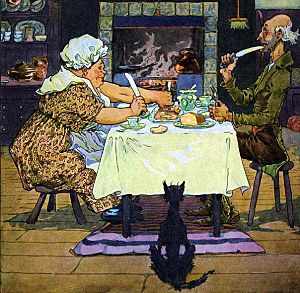Jack Sprat facts for kids
Quick facts for kids "Jack Sprat" |
|
|---|---|

Jack Sprat and his wife by Frederick Richardson
|
|
| Nursery rhyme | |
| Published | 1639 |
| Songwriter(s) | appeared in John Clarke's collection of sayings |
"Jack Sprat" is a famous English language nursery rhyme. It's a short poem that many children learn. This rhyme has a special number, 19479, in the Roud Folk Song Index, which helps keep track of traditional songs.
Contents
The Rhyme
Here is the most common version of the "Jack Sprat" rhyme that people know today:
Jack Sprat could eat no fat.
His wife could eat no lean.
But, together both,
They licked the platter clean.
Where Did "Jack Sprat" Come From?
The name "Jack Sprat" was used a long time ago, in the 1500s, to describe people who were small. This rhyme started as an English proverb, which is a short saying that gives advice or states a general truth. It was known by the mid-1600s.
Early Versions of the Saying
The rhyme first appeared in a collection of sayings by John Clarke in 1639. It was a bit different back then:
Jack will eat not fat, and Jull doth love no leane.
Yet betwixt them both they lick the dishes cleane.
Possible Hidden Meanings
Many nursery rhymes, including "Jack Sprat," might have started as a way to make fun of important people. This is called a satire.
One idea is that "Jack" could have been King Charles I. He was a short man. Some historians think the rhyme meant that King Charles I was "lean" because the government (parliament) didn't want to give him money through taxes. But with his queen, Henrietta Maria, he could "lick the platter clean" after he got rid of parliament. This meant he could do what he wanted without their approval.
Another idea links the rhyme to the popular Robin Hood stories. It might refer to King John, who was not very popular, and his queen, Isabella, who was seen as greedy.
Becoming a Nursery Rhyme
The saying became a well-known nursery rhyme when it was printed in a book called Mother Goose's Melody around 1765. However, it's possible that children were using it even earlier than that.
 | Isaac Myers |
 | D. Hamilton Jackson |
 | A. Philip Randolph |

